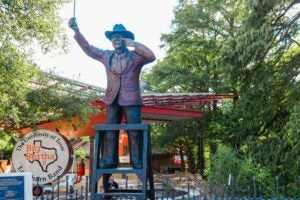
|
|
WATCH AUDIO SLIDE SHOW of “Mr. B” and Steven playing a game of dominoes (opens in QuickTime Player). Running time1:26. Download QuickTime Player. |
“The focus is to give pharmacy students the opportunity to enhance the quality of life of an older individual and learn from the real life experience,” said faculty member Arlyn Kloesel, who established the class eight years ago.
His idea was for the students to provide companionship and social support to their assigned match while learning to care for seniors and develop empathy and respect for this segment of the population.
Pharmacists for years have played a role in providing social support to elderly people, Kloesel said, and now the number of persons over 85 is expected to double in the next few years.
“Many ambulatory elderly patients communicate with their pharmacist more frequently than any other healthcare professional,” he said.
“Mr. B” tells Steven he was born in Illinois and moved to the “Indian Territory” (what is now the state of Oklahoma) in 1906, eventually working as a geologist all over the south and southwest United States. He has a passion for dominoes and carries a box of them in the “trunk” of his wheelchair.
“It’s in the genes, I’d say,” said “Mr. B,” whose father and mother were 100 and 99 years old, respectively, when they died.
Steven talks about growing up in El Paso and how the pharmacist shortages in his hometown attracted him to the field. Building a relationship with an older person is a new experience for Steven and other students whose grandparents have either died or do not live nearby.
“It’s important for us to learn how to interact with the elderly,” said Steven. “We need to be prepared. I am amazed by ‘Mr. B’ who just the other day recited a poem to me that he had learned 90 years ago.”
Students are learning about medications used to treat common medical conditions affecting elderly people in addition to improving their verbal and non-verbal communication skills.

|
|
Eighty-nine year-old Sarah has participated in the College of Pharmacy CARE program for four years. This year, she is matched with first-year student Erica, who is from the Rio Grande Valley and believes there is a lot to be learned from elderly people.
|
More and more pharmacists, said Kloesel, are now expanding their role in patient care by accepting new responsibilities of identifying drug-related problems such as adverse drug reactions or drug interactions, resolving these problems and trying to prevent future drug-related problems from occurring.
“Elderly patients are particularly in need of this type of pharmaceutical care because most are affected by multiple diseases and are taking multiple medications,” he said.
Another elderly person participating in the CARE program is “Ms. J” who says she takes a “conglomeration” of pills a day 24 to be exact.
“I’d like to quit, but I guess it’s keeping me living,” she said.
Bickkie, a university pharmacy student originally from Australia, is assigned to “Ms. J” and keeps tabs on what medications she is taking. All of the students can look at medical charts and observe how residents take their medications as they learn about different medicines and the importance of medication adherence.
“Ms. J” considers Bickkie an adopted granddaughter. Although she likes country music, Bickkie is more of an “easy listening” person and regularly brings “Ms. J” the CDs of pianist Richard Clayderman.
“I consider our relationship more of a friendship,” said Bickkie, who works as a pharmacy technician at North Austin Medical Center and wants to pursue a pharmacy career in a hospital setting. “I’m part of her life now, and she’s part of mine.”
The CARE program, Bickkie said, is “great exposure for young students, allowing us to learn about the elderly in ‘real life’ and not just something from a textbook.”
“Ms. J” is a crafts aficionado and the two get down to working on greeting cards and place cards during their visits. Angels, which “Ms. J” collects, are a predominant theme. She made bookmarks for all of the university students involved in the CARE program.

|
|
Bickkie hadn’t had much experience with the elderly until she was matched with “Ms. J” at the Beckett Meadows assisted living facility. In addition to the learning component of the CARE program, Bickkie says providing friendship to “Ms. J” also has been rewarding.
|
“Mr. B” and “Ms. J” live at the Beckett Meadows assisted-living facility in south Austin.
Residents who live in assisted living facilities need someone to help them with one or more daily living activities like fixing meals, personal care or housekeeping, said Kloesel.
This option for older adultswhich is seen as part of a continuum of care between independent living, assisted living, rehabilitation, skilled nursing home, hospitalization and non-skilled nursing homehas become increasingly popular in the past decade.
“Many elderly persons reside in independent or assisted-living facilities because they are too healthy to live in skilled nursing homes,” he said.
Beckett Meadows Executive Director Brandon Erickson says most of his residents “have wonderful families who visit them regularly. But, the visits from the university students are different.
“The student visits give the resident a chance to meet someone newsomeone young and energetic who is making a novel career choice. They are flattered that a college student would take the time to get to know them. The resident may be 60 to 70 years older, but there is always a connection that can even lead to a lasting friendship.”
Heather, a third-year pharmacy student who was matched with “Mr. B” two years ago when he was just 100, believes most students are apprehensive when first entering the program. She sometimes brought her young daughter on her visits with “Mr. B” and they all played dominoes.
“Initially, you may not know what to say to the elderly person, perhaps thinking you will not have anything in common,” she said.
“We have this fear that they will be fragile or not be able to understand us, but there is a lot more common ground than you think. The program helps you get over these sometimes pre-conceived communication barriers.”

|
|
College of Pharmacy faculty member Arlyn Kloesel (left) initiated the CARE program in 1999 with just one assisted living facility and 35 students. Today, the program is a required course for first-year students and involves seven facilities and about 125 students a year. Brandon Erickson is the executive director of Beckett Meadows in South Austin.
|
Kloesel initiated the CARE program in 1999 with Dr. Jamie Barner, also of the College of Pharmacy. Today, he is the only faculty member involved. The class started as an elective portion of the Introduction to Pharmacy course, but since 2003 has been required.
It began with just one assisted-living facility and 35 students. Seven assisted-living facilities and 125 pharmacy students are participating in the 2007-08 academic year. One of the residences, Barton House, is an all-Alzheimer’s unit, although other facilities involved in the program have a portion of their unit dedicated to persons with the disease.
Students in the CARE program visit their resident twice a month and are encouraged to see them more often. In addition, they are required to participate in small group discussions during the academic year to share their experiences with peers. They also attend lectures on subjects like dementia, write papers and keep journals, which allow the students to document their observations of the elderly person after each visit and provide written “reflections.”
“The learning opportunities are limitless,” said Kloesel.
Jennifer, a third-year student, has been a group discussion facilitator for two years. She believes the discussions serve a crucial role in the program.
“The students have an opportunity to learn what others are going through with their elderly person and also provide insights on how to deal with certain situations,” she said, adding that students also present case studies of certain diseases in addition to learning about different medications.
There are two students in her group who are matched with someone with late-stage Alzheimer’s disease, which has the potential for totally different experiences and problemsespecially with communication.

|
|
Students attend small group discussions to talk about different medicines, side effects and their experiences with their assigned elderly “matches.” Third-year student Jennifer has been a facilitator at these meetings for two years.
|
“Learning to enhance your communication skills with the elderly is sometimes the hardest part for all of the students,” Jennifer said. “I’ve been a pharmacy intern at CVS since 2002, and seniors represent the majority of the people I see. They are always good about asking questions.”
Erica, a first-year pharmacy student from the Rio Grande valley, works as a pharmacy technician at a local Target.
“It is important to ensure that all patients, especially the elderly, understand why they are taking certain medications,” she said.
She is matched with 89-year-old Sarah, who lives at Parmer Woods in north Austin.
“I love the CARE program because it’s independent hands-on experience,” Erica said. “I am initially matched with a person, and then it’s all up to me to make it work.”
Erica has realized that Sarah is just “like every other adult. We all have projections about ourselveswhat we will be like in 30, 40 or 50 yearsand I’d like to be just like her.”
Sarah has participated in the CARE program for four years and says she has valued every one of her “matches.”
“I’m around older people most of the time, so it’s nice to have a young person come see me,” she said. “We enjoy our girl talk.”
The students continue to be amazed by the positive attitude of most of the seniors even though some are fighting numerous medical problems, Kloesel said.
“Mr. B” says he has heart disease, skin problems, arthritis and other illnesses and sometimes feels that “it was fun to be 100 years old, although it has been downhill since then.
“But the longer I live, the more I realize how important attitude is,” said “Mr. B” as he reaches back in his memory for another quotethis one from clergyman Charles Swindoll: “Life is 10 percent what happens to me and 90 percent how I react to it.”
By Nancy Neff
Photos: Christina Murrey



